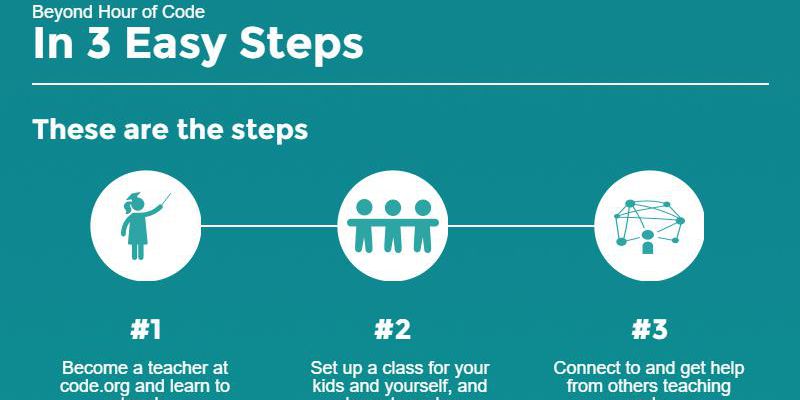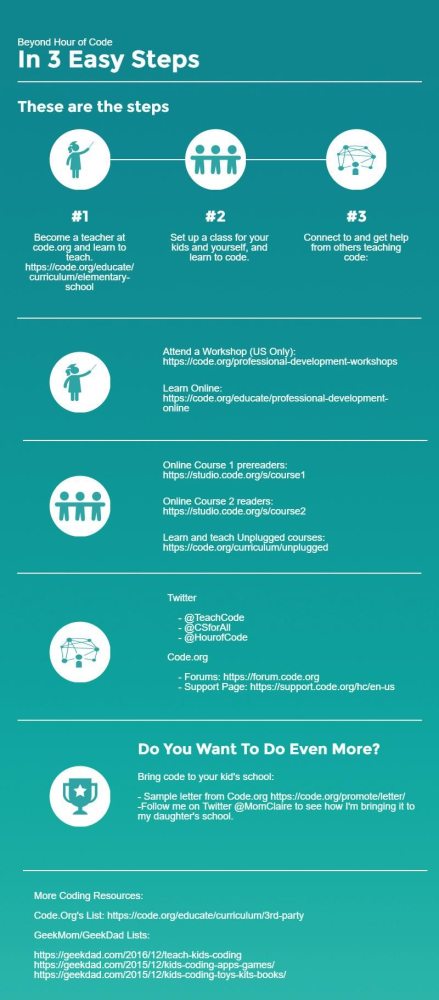
If your kids were like many others last week, they took part in Hour of Code. They got a taste for what it is like to program. If you are lucky, they want more. If you don’t program, or even if you do, you might not know where to start. I have good news for you. You can expand your child’s programming education, and even learn it yourself, with a little help from code.org.
Code.org does Hour of Code each year, which have reached 321,310,736 students as of this writing. Not only do they create new content for Hour of Code each year, but they have also gathered options across the web for you to use. This is a great introduction, which I referenced when bringing Hour of Code into my daughter’s class last year.
If you were like me, after doing an hour of code, you wanted to do more. This year, I am using code.org to bring more to my daughter, and to her class. You can do this as well, here is how:

Step 1: Become a Code.org Teacher
Sign up for Code Studio as a teacher, and get access to the lessons for your child or children. This is great if they are home schooled, or if they do not have a good computer program in their school. If you are in the United States, you can attend a teacher workshop. If you do not have a local workshop, code.org has an online workshop as well.
Step 2: Learn to Code With Your Kids
Once you are a teacher, you can add your child and yourself to a class to learn right along with your child. The wonderful thing about code.org’s code studio is that it is designed to have the teacher learn right along with the student. It also covers something called pair programming early, which will allow you to be a student along with your child. From here, you can start with Course 1 for prereaders or Course 2 for readers with your child. Alternatively, you can do the do the unplugged lessons without a computer.
Step 3: Connect To and Get Help From Others
Once you are teaching your children, connect with other teachers on twitter by following @TeachCode, #CSforAll, and #HourofCode. From there, you will be able to find and follow many others who are making programming accessible to the masses. For Code.org specific issues, go to their forums and their support page.
Want to do even more?
Bring programming to your student’s class. Code.org provides a sample letter that you can bring to help teach. Additionally, I will be doing a write-up on bringing code to my daughter’s kindergarten class, so check back here, or follow me on Twitter to see that when I post it.
Expand to content outside of code.org. Code.org has a good list to start exploring your options. Additionally, GeekMom and GeekDad have lists of options you can review here, here, and here.
What do you say, are you ready to teach your kids code, and learn along with them? It is as easy as 1, 2, 3. Let us know what you are doing to teach your kids in the comments below.



There are also more and more options for after school and weekend enrichment coding classes around the country. Just search for “kids coding classes” in your city, and probably at least 2 or 3 will be there!
Thanks Tamasin,
You are right, there some great classes out there. There are also many wonderful resources that could be used instead of or in addition to code studio if people look online.
What I like about this option, and why I decided to highlight it is:
1) It is available (almost) anywhere in the world. Parents without a home internet connection can go to the library, print out the unplugged lessons, and do them at home. Parents who live in the country, and don’t happen to have classes near them can do this. It comes in many different languages for those who speak another language. It can be used in a homeschooling environment. It is more accessible to many parents.
2) It is free. Parents on a tight budget can use it at no cost. Currently, computer science is more accessible to those with money than those without, and we are missing out on some good programmers because of this. It is more affordable to many parents.It is more affordable to many.
3) It is made for teachers with no knowledge of coding to learn along with parents. This gives a good for parents who want their kids to know code, but are afraid of it. It is more approachable.
4) It can be done whenever it works for a family. Even if that is 6 in the morning. It is more flexible to meet the needs of a busy family.
In short, this article is aimed at anyone limited by one or more of these factors, and can open options where their may not have been options before.
It is but one of many great options people can choose to learn or teach their kids code. That said, it is one of the most accessible, affordable, approachable, and flexible option for those who have traditionally had no access to the other resources out there.
Thanks again for stopping by and dropping us a line.
Claire,
Thanks for highlighting these great options. For those who are looking for in-person, instructor-led options for either kids coding classes or camps; there are several emerging solutions that could be worth investigating. This can often better approximate how kids are used to learning & especially with a topic like programming it can be essential to prevent kids from being frustrated or thinking the subject is too difficult by collaborating with peers & having a knowledgeable instructor who can help them get unstuck.
Thanks for highlighting these great options. For those who are looking for in-person, instructor-led options for either kids coding classes or camps; there are several emerging solutions that could be worth investigating. This can often better approximate how kids are used to learning & especially with a topic like programming it can be essential to prevent kids from being frustrated or thinking the subject is too difficult by collaborating with peers & having a knowledgeable instructor who can help them get unstuck.